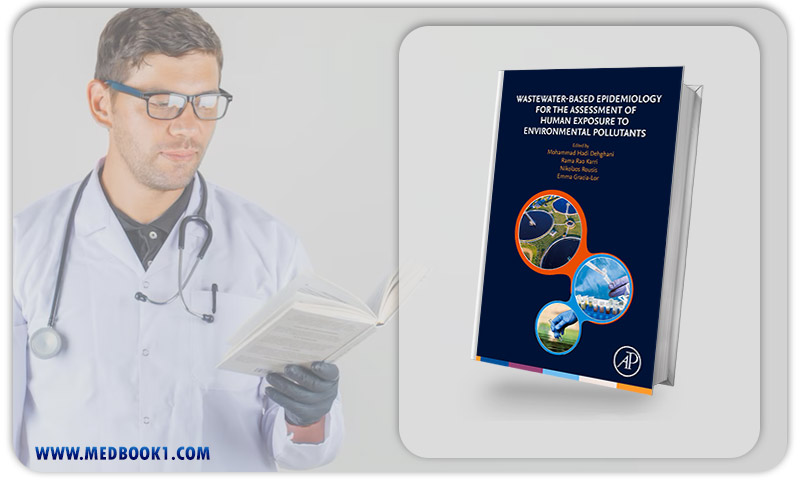Wastewater-Based Epidemiology for the Assessment of Human Exposure to Environmental Pollutants (Original PDF from Publisher)
Wastewater-Based Epidemiology for the Assessment of Human Exposure to Environmental Pollutants (Original PDF from Publisher)
$195.00 Original price was: $195.00.$25.00Current price is: $25.00.
- The files will be sent to you via E-mail
- Once you placed your order, we will make sure that you receive the files as soon as possible
Wastewater Based Epidemiology for the Assessment of Human Exposure to Environmental Pollutants (Original PDF from Publisher)
1.1.Description
the book “Wastewater Based Epidemiology for the Assessment of Human Exposure to Environmental Pollutants” extensively covers wastewater-based epidemiology (WBE) and its crucial role in monitoring human exposure to hazardous pollutants and pathogens.
The book investigates the health implications stemming from various pollutants found in wastewater, including pesticides, heavy metals, pharmaceuticals, phthalates, personal care products, and endocrine disruptors.
It explores how WBE aids in assessing health risks linked to infectious diseases caused by viruses (such as SARS-CoV-2), parasites, and bacteria.
Additionally, the book delves into detection and sampling techniques, analytical methods, biomarkers, and the utilization of biosensors in WBE studies. It highlights the significance of WBE in identifying emerging areas, offers strategies to diversify in pandemic situations for immediate public health goals, and details the surveillance of pathogens spread through wastewater.

Wastewater Based Epidemiology for the Assessment of Human Exposure to Environmental Pollutants
1.2.Key Features
Based on the provided context, the key features of “Wastewater Based Epidemiology for the Assessment of Human Exposure to Environmental Pollutants” are:
- Comprehensive Coverage: The book offers an extensive exploration of wastewater-based epidemiology (WBE), covering its application in assessing human exposure to a wide array of environmental pollutants and pathogens.
- Pollutant Focus: “Wastewater Based Epidemiology for the Assessment of Human Exposure to Environmental Pollutants” examines the health impacts of both organic and inorganic pollutants present in wastewater, including pesticides, heavy metals, pharmaceuticals, phthalates, personal care products, and endocrine disruptors, providing a comprehensive understanding of their effects on human health.
- Pathogen Assessment: Beyond pollutants, the book delves into the application of WBE in assessing the spread and health risks associated with infectious diseases caused by viruses (such as SARS-CoV-2), parasites, and bacteria present in wastewater.
- Methodological Insights: “Wastewater Based Epidemiology for the Assessment of Human Exposure to Environmental Pollutants” discusses various aspects of WBE studies, including detection techniques, sampling methods, analytical approaches, biomarkers, and the use of biosensors, providing valuable insights into the methodologies employed in assessing environmental pollutants and pathogens through wastewater analysis.
- Emerging Areas and Pandemic Strategies: “Wastewater Based Epidemiology for the Assessment of Human Exposure to Environmental Pollutants” addresses emerging areas in WBE studies, mapping evidence to identify new trends, and offers strategies to diversify and expand WBE practices, especially crucial in pandemic conditions for immediate public health goals.
- Surveillance of Pathogen Spread: It explains how WBE serves as a tool for monitoring and surveilling the spread of pathogens through wastewater, providing insights that can contribute to public health interventions and measures.
These features collectively position “Wastewater Based Epidemiology for the Assessment of Human Exposure to Environmental Pollutants” as a comprehensive guide, essential for researchers, environmental scientists, public health professionals, and policymakers seeking to understand, assess, and manage human exposure to environmental pollutants and pathogens through wastewater analysis and epidemiological approaches.

Wastewater Based Epidemiology for the Assessment of Human Exposure to Environmental Pollutants
1.3. About Writer
Mohammad Hadi Dehghani is a prominent figure in environmental health engineering, renowned for his substantial contributions to the field.
Holding a Ph.D. in Environmental Health Engineering, Dehghani is an esteemed professor and researcher at reputable academic institutions.
His expertise primarily focuses on environmental pollution, water quality assessment, and wastewater treatment technologies. Dehghani has authored numerous scholarly articles, research papers, and books that extensively explore the impact of environmental pollutants on human health and ecosystems.
His research also encompasses the utilization of innovative techniques in environmental remediation and pollution control.
Dehghani’s work has significantly contributed to advancing knowledge in environmental health sciences, earning him recognition as a leading authority in the field and making a substantial impact on strategies for managing environmental pollutants and ensuring global health and sustainability.

Wastewater Based Epidemiology for the Assessment of Human Exposure to Environmental Pollutants
Summary
“Wastewater Based Epidemiology for the Assessment of Human Exposure to Environmental Pollutants” presents a comprehensive exploration of wastewater-based epidemiology (WBE) and its critical role in evaluating human exposure to diverse environmental pollutants and pathogens.
Authored by experts in the field, the book scrutinizes the health implications of a wide spectrum of pollutants found in wastewater, including pesticides, heavy metals, pharmaceuticals, phthalates, personal care products, and endocrine disruptors.
It extensively discusses the application of WBE in assessing health risks associated with infectious diseases caused by viruses, parasites, and bacteria, including the recent focus on SARS-CoV-2.
Alongside this, the book details detection techniques, sampling methods, analytical approaches, and the use of biosensors in WBE studies.
Additionally, it emphasizes the identification of emerging areas, strategies for diversification during pandemics for immediate public health goals, and the crucial role of WBE in tracking the spread of pathogens through wastewater, serving as a vital tool in safeguarding public health.



Reviews
There are no reviews yet.